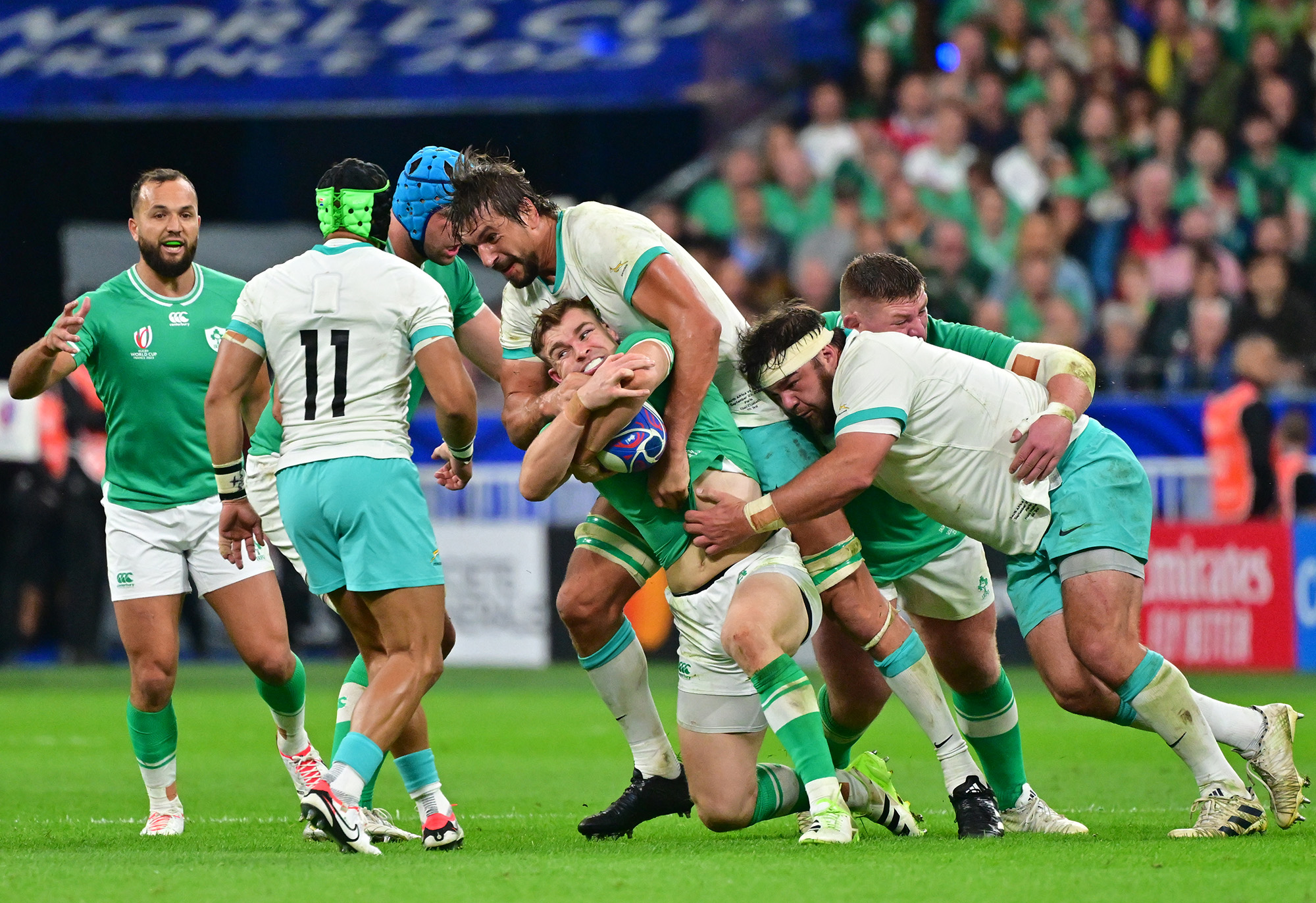RWC 2023 ANALYSIS
Collusion capers — there will be no repeat of Gijón at Stade de France when Ireland and Scotland clash

The idea of collusion at Rugby World Cup 2023 was raised by a French journalist after the Springboks’ 49-18 win over Tonga in Marseille last Sunday.
At the 1982 Fifa World Cup in Spain, a little piece of the sport died forever. It had been a magnificent World Cup to the point it wasn’t, and it changed regulations forever.
The wonderful Brazilian team with Socrates and Zico were dazzling, and England were surprisingly good, opening their tournament with a 3-1 win over eventual semifinalists France.
A young Maradona made his World Cup debut, Poland with the exceptional Zbigniew Boniek were making people sit up and Algeria had caused one of the great upsets in football history by beating West Germany 2-1 in Gijón.
The Spanish sunshine and love of soccer gave the entire tournament a warm glow that even in sepia-toned YouTube clips still feels fun today.
Read more in Daily Maverick: Rugby World Cup 2023
Non-aggression pact
But the tournament turned sour on the night of 25 June in what became known in German as the Nichtangriffspakt von Gijón (the non-aggression pact of Gijón). The same stadium that saw Algeria’s greatest day, also hosted what became Algeria’s worst day.
After their stunning and thoroughly deserved win over West Germany, Algeria lost 2-0 to Austria. They followed that with a 3-2 win over Chile. All they needed to advance to the next phase of the tournament was for Austria to draw or beat the Germans. Or, if the Germans won, they needed to win by three clear goals to eliminate Austria.
Instead, the two European nations produced one of the most despicable acts of sporting collusion ever seen to manufacture Algeria’s exit.
Germany scored an early goal, putting them 1-0 up. The game continued to be competitive until halftime, with both sides having a few chances to score.
But after the break, it stopped being a contest. Players from both sides in attacking positions started hitting 30m back passes. If the score remained 1-0 in West Germany’s favour, both sides would advance at Algeria’s expense.
The crowd, sensing what was happening, started hissing and cursing the teams. Algerian fans waved money, indicating it was a “fix”. Even the German and Austrian TV commentators were appalled by what was unfolding, with the Austrian telling viewers to turn off their TVs as he refused to commentate on the last 10 minutes.
“What’s happening here is disgraceful and has nothing to do with football. You can say what you want, but not every end justifies every means,” German commentator Eberhard Stanjek told his viewers.
Afterwards, both sets of players were rightly attacked in the media and even though Algeria protested, their fate was sealed. There was no regulation against teams kicking the ball about without any intention of scoring.
It was this game that changed Fifa’s regulations and brought about the situation that all final group matches at World Cups now kick off at the same time, to avoid the possibility of collusion.

Garry Ringrose of Ireland in action during the Rugby World Cup France 2023 match between South Africa and Ireland at Stade de France on 23 September 2023 in Paris, France. (Photo: Christian Liewig – Corbis / Getty Images)
No collusion
The idea of collusion at Rugby World Cup 2023 was raised by a French journalist after the Springboks’ 49-18 win over Tonga in Marseille last Sunday.
It was the final question at the Boks’ post-match press conference. It was asked in French and coach Jacques Nienaber had to request the question be repeated because he either couldn’t believe it or didn’t understand it.
When he finally got the gist of the question, Nienaber repeated it aloud, as if to convince himself it had really been put to him.
“Could I believe in a scenario where they would decide that they want to get this amount of points and then get South Africa out of the way?” Nienaber repeated rhetorically to his inquisitor.
The “they” in question were Scotland and Ireland, who meet in Saturday night’s Pool B finale in Saint-Denis. A Scottish victory by 21 or more points with Ireland earning a bonus point (for scoring four tries) would see the Springboks eliminated.
“That would probably be match-fixing, I would say,” Nienaber said, bristling that this was even being raised. “I hope not. Rugby is clean, we wear those T-shirts. I hope not, because that would be extremely disappointing, don’t you think?”
Naturally and rightly, Ireland and Scotland have both scoffed at the suggestion of collusion to manipulate that outcome, which if it happened would be one of the most astounding results in rugby history.
The last time Ireland scored four tries but lost to Scotland was in 1991, and even then the losing margin was only three points as they went down 28-25. It’s one of only two times Ireland have scored four tries and lost to Scotland — the other being in 1938 when they lost 23-14.
It’s impossible to imagine Ireland scoring four tries but somehow losing the match by more than 21 points.
But sport being sport, sometimes genuinely amazing things happen.
Liverpool’s 4-0 win over Barcelona at Anfield to overturn a 3-0 first-leg deficit springs to mind. The European Ryder Cup teams’ “Miracle at Medinah” in 2012 is another, when they scored 8.5 out of 12 possible points in Sunday’s singles to win the Ryder Cup.
Nothing in sport is guaranteed. If Ireland suffer an early red card and if Scotland have a sublime day with Finn Russell at his ebullient best, perhaps they can win and win well.
What you won’t see though is two teams not trying. It will be a full-on slugfest between two great rivals and the result will be decided by effort, skill and some luck. But it won’t be the outcome of collusion.
Unlike Gijón 41 years ago, there will be no reason to turn off your TV sets with 10 minutes to go, because Ireland and Scotland, two of the best teams in the world, will play with everything until the final whistle.
Rugby has many problems and issues to deal with, but collusion is not one of them. DM


















 Become an Insider
Become an Insider
“Soccer is a gentlemans game played by hooligans and rugby is a hooligans game played by gentlemen” Fear not, fellow South Africans 🙂
Ja, boet 😁